Editor’s Note
This article was originally published by China Philanthropist on the 28th of April 2017. It is about an American teacher named David Deems who has spent the last 17 years living in Dongxiang Autonomous County, in Northwestern China’s Gansu Province. The area is home to the Dongxiang people, a small Muslim ethnic group of Mongolian origin and one of China’s 55 recognized ethnic minorities. In this area where few outsiders reside, David has dedicated himself to assisting the development of the local schools through fundraising, teaching, and even going door to door to get families to send their children back to school. His fundraising efforts have raised large amounts of money, while he has continued to subsist on a monthly wage of just a few hundred Yuan as an educational consultant. His selfless and uninterested dedication to his cause have earned him the sincere admiration of the local people.
His name is David Deems, but he gave himself the Chinese name of Ding Dawei. He was born into a middle-class family in the US and when he began university he specifically chose to learn Chinese. That’s when his affinity for China started.
In 1989, David began studying Chinese at Peking University, during which time his love for China increased.

When he returned home, he finished his graduate studies in Classical literature, after which he decided to become a teacher. After careful consideration, he decided to return to China. While in Beijing, David learned that what China needed most was education, so he decided he could use his own knowledge to teach children in remote areas of China. While on vacation in Hong Kong in 1994, he met a teacher named Mary who introduced him to a private school in Zhuhai, where he became an English teacher.
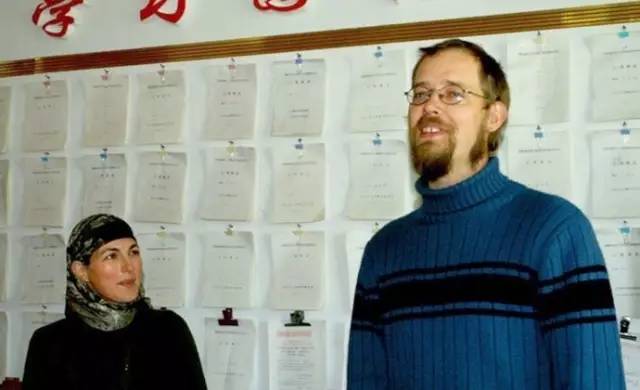
David was shocked when he arrived at the school in Zhuhai. He complained to school officials after they provided him an apartment furnished with an air conditioning unit and a refrigerator. What shocked him was that his living conditions were far better than those of the other teachers.
He stormed into the headmaster’s office and demanded to live in the teacher’s dormitory. “I don’t need that nice of a place all to myself. I don’t cook, I don’t need a refrigerator, I just want to live with the other teachers.” The headmaster had a hard time comprehending, but in the end respected David’s wishes and moved him to an 8-person dormitory. David was still unsatisfied though, demanding that the headmaster lower his wage.
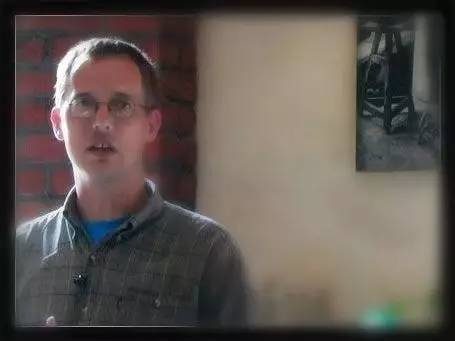
After teaching at the private school in Zhuhai for a while, David felt that he was “wasting his time” because the students’ conditions were already pretty good. He needed to go somewhere a little more remote where he could teach students who needed more help.
After doing some research, he decided to head to northwest China. Several twists and turns later, he arrived at Northwest Minzu University with his CV in hand. “Hello, my name is David Deems. I previously taught elementary students in Zhuhai, but now I’ve come here to teach at a university.” After viewing David’s CV, the teacher was surprised to see that in the “Activities I enjoy” slot, David wrote “helping others.”

After a year and a half at the university, David was still living in the university office because of problems with official procedures. The tight room proved to be uncomfortable for David’s 1.93 meter frame. Aside from this, the school was unable to provide any wages to him. He didn’t find this to be a big deal though. Instead, he kept finding new jobs to keep him busy.
But when the school started giving David his wages, he had another issue with the school. The school had chosen to give him 1200 yuan per month, but he insisted on only receiving 900 yuan. The school was insistent on giving David at least 1000 yuan, but he thought a four-digit salary was much too high. After compromises on both sides, David’s wage was set at 950 yuan.
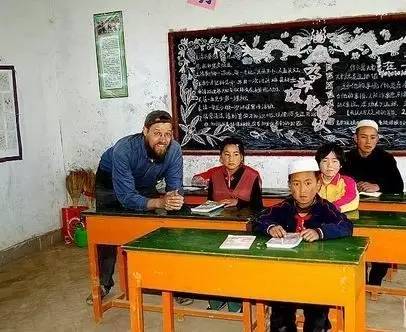
While at Northwest Minzu University, David started an “English Corner”, where he connected students with foreigners to enable cross-cultural exchange. David’s humor, sincerity and amicability soon gained him the respect of the school. Afterwards, while teaching at the university, David continued searching for more hard-pressed areas where he could teach.
He eventually found out about the Dongxiang Autonomous County, an arid area nestled between the mountains of Gansu province, where the living conditions are known to be extremely destitute. Out of the 56 ethnic groups in China, the local Dongxiang have the lowest levels of education, the highest levels of illiteracy and the second-lowest rate of students finishing 9th grade in China. David thought this was perfect and decided to go to Dongxiang!

Upon arrival in Dongxiang, the locals were not entirely friendly to David. In addition, the remoteness of Dongxiang made him a little uncomfortable at first. The county of 500,000 was so remote that no one spoke standard Mandarin; people from outside couldn’t even understand the Dongxiang accent. This undoubtedly made working extremely difficult, but David still decided to stay.
David was hired by the education department as an educational adviser, but formal hiring procedures lasted more than a year, during which time the promised 500 yuan wage never arrived. David could only rely on the money he had saved up from before.
He doesn’t smoke, doesn’t drink and his lifestyle is very simple. One article of clothing lasts him seven or eight years and when his shoes are well worn out, he still uses them. When faced with economic issues, David maintains his good-natured spirit.
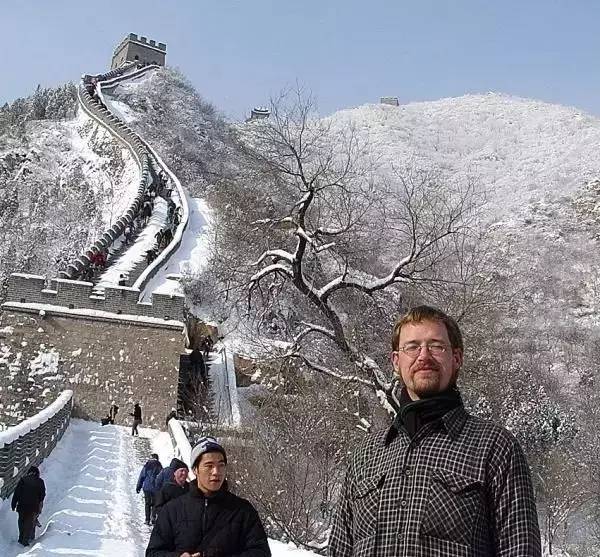
What David was most grateful for was that the locals had started to get more friendly with him. In order to make ends meet, he was forced to rely on wages from being a substitute teacher. In these two busy years, David was able to help seven schools in Dongxiang turn over a new chapter by helping 200 students enrol in classes, particularly girls who never enrolled in school. Many children’s lives changed because of this: they learned what a basketball was and received new class material. They expressed sincere respect and adoration towards David.
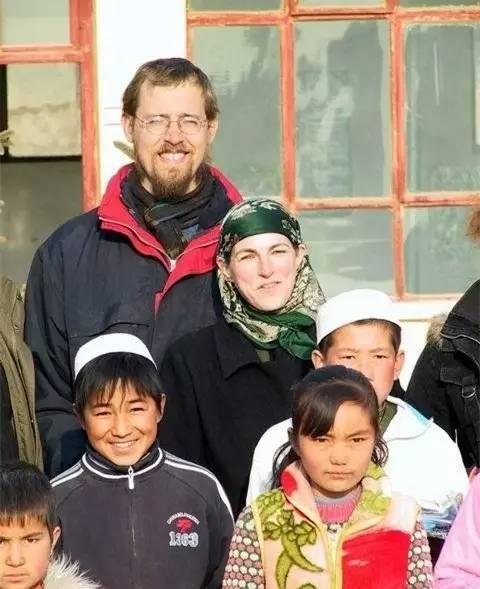
After eight years, David had collected donations for eleven schools in Dongxiang in addition to successfully inviting some excellent teachers to teach there. As an educational advisor, his main job was to walk down mountain roads every week to all the schools in the district, where he would do a check-up on the students, facilities and general situation of all the schools.
When he encountered situations where students weren’t coming to school, David would personally contact the teacher and parents and convince them to let the child attend classes. Whenever he arrived at a school, he would ask “What does the school need me to look into? What does the school need me to do? Do the teachers need help with anything?”
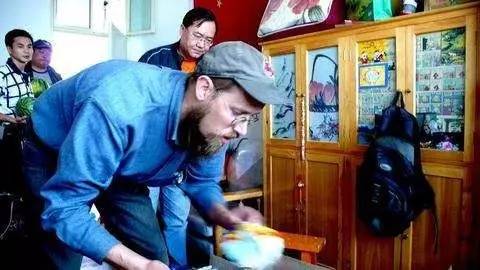
Once, one of the schools in the district that David oversaw had to close for various reasons. David ran around collecting donations for it, eventually enabling the school to resume classes.
He brought teachers from door to door asking the parents to let their children come back to school, somehow doubling the school’s enrolment. The school’s basketball hoop, water well and ping-pong table were all set up thanks to David’s hard work.
This is what the teachers at the school said: “We express sincere gratitude to him. Even though this is still a simple and crude school, the students’ lives and fortunes changed because of him. After this, children can go to middle school and high school. If it weren’t for this elementary school, everything else would be out of the question.”

Aside from fixing up the school, he also brought local teachers on educational trips to Beijing and Zhuhai. Living in a closed-off place like Dongxiang, these teachers hadn’t ever seen anything as grandiose as Tiananmen Square or the ocean. Some hadn’t even seen a local passenger train.
When the local teachers were standing in front of Tiananmen Square and the Bird’s Nest, they were absolutely speechless. David hoped that this experience would expand their horizons and that they would tell the students at the school about what they saw. Only this way could the students ever hope to get out of Dongxiang.
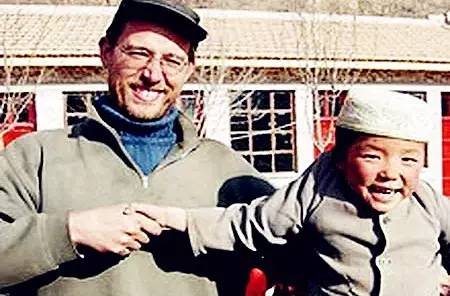
David does not like to be bothered by the media, but if it is for fundraising, he is willing to put his name out there. After a while he established an account called “Ding Donations”. From the beginning he sought donations from all over, attracting many peoples’ interest in his project. Over the course of eight years, he raised one million yuan, every single yuan of which was spent on Dongxiang’s schools.
But of course many people started saying things like “who knows where all that money went”, and “why would an American with such good intentions come to a place like Dongxiang?”. When faced with questions like this, David would say with a smile: “It’s a little hard to understand, isn’t it? Actually my thought process is very simple, which is: why not put more educational resources to use where they are needed the most?”
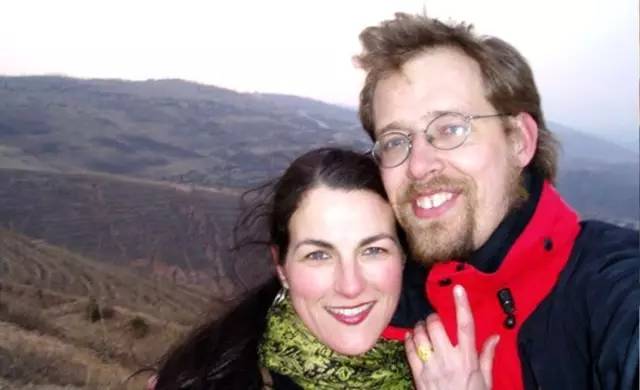
During a ten year span, David recorded every dime that he raised in a ledger. Where it came from, where it was spent; he wrote it all down clearly. Once there was an elementary student that donated one yuan. At first David didn’t know what to do with it, but then he bought a 20 cent envelope and an 80 cent stamp and sent a thank you letter to the child. He even recorded this small donation in his ledger.
Every time he took teachers out for field trips, he recorded every dime spent. In order to allow more teachers to attend these field trips, he made travel arrangements on a strict budget. Between 2000 and 2008, he used 6 ledgers to record all of the donations and expenses, even copying it all on a second set of ledgers.
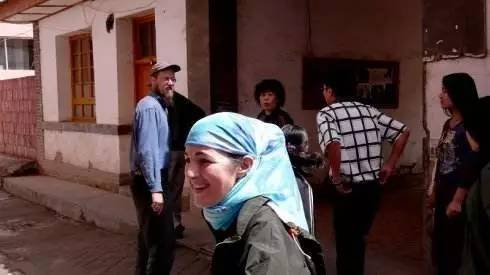
Always keeping himself busy, David was thirty years old when he finally met his true love, an American named Stacy. By chance, David was studying at Qinghai University when he ran into Stacey, who at the time was a teacher at Qinghai Minzu University. He fell in love with Stacy at first sight and repeatedly found opportunities to get close to her. In 2005, the couple went back to America to get married. Afterwards, Stacy accompanied David to Dongxiang, where the couple busied themselves with work.
Stacy and David’s interests are similar and they both lead simple lives. The two live together in a house without electricity and dress the same as the people in Dongxiang. When they got married, they simply bought each other handmade rings. In addition, their combined monthly wage amounted to only 1200 yuan. Every week, Stacy went with David to visit all the schools in Dongxiang.

As far as David’s life choices, his parents expressed understanding. His whole family works in education, but he was the first to decide to teach in a rural setting. “I’m not a reincarnation of Lei Feng, I’m just a regular teacher and this is the place where I was meant to come. The kids here were meant to learn.”
During the National Day break in 2003 David’s family came to Dongxiang to see him, during which time David took his 66 year-old father and two 70 year-old uncles around Dongxiang, where they helped him construct a brick enclosure wall for one of the schools. Right before David’s father left to return home, he left all his spare money with David.
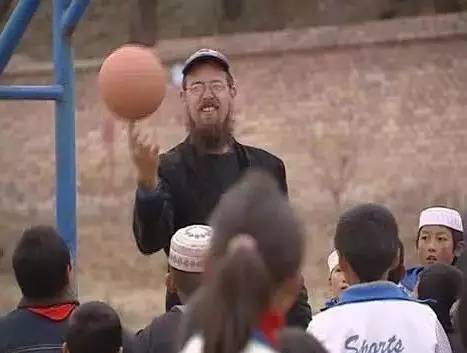
As far as China’s education goes, David has always been trying to find a balance.
“American education is different- we don’t make students recite things, but rather we make students understand more in depth concepts. For example, when reading a textbook, we hope a student can use their own words to summarize the concept or use the concept to analyze an issue. We’re more interested in nurturing individuality and encouraging them to consider real-world issues. Education and upbringing are two different aspects, but China is perhaps more concerned with tests and grades. These two aspects are both very important, one contributes to society and the other to the individual. A person who understands things and concepts can make contributions to society. Our priority is to instruct students on how to understand society.”
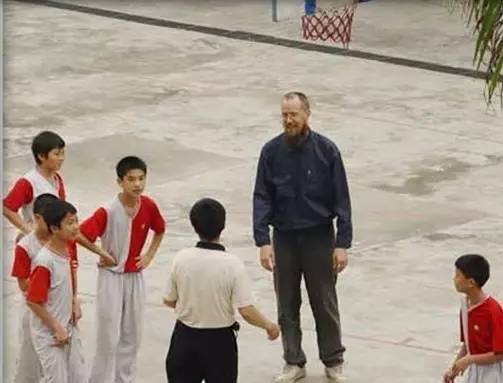
All these years, David has hung a Chinese flag on the wall in his small room. He hangs the flag there to remind himself that “this is China, not America, I am in Dongxiang and however they want to develop their education or plan their future, I should respect them.”
Many teachers have asked David in private question like “What kind of repayment do you want to get from this?” David always responds with: “I don’t need repayment, I just want the kids to receive the education they deserve. If we can do this, I’ll be content enough.”
When faced with praise and attention from others, David always humbly responds that “I am no specialist or scholar, I’m just an ordinary teacher. My house wasn’t built by me and the classes aren’t taught by me. I actually haven’t done anything, I’m just an intermediary. The real heroes are the teachers that stay behind and the people who don’t know anything about Dongxiang but still donate money.”
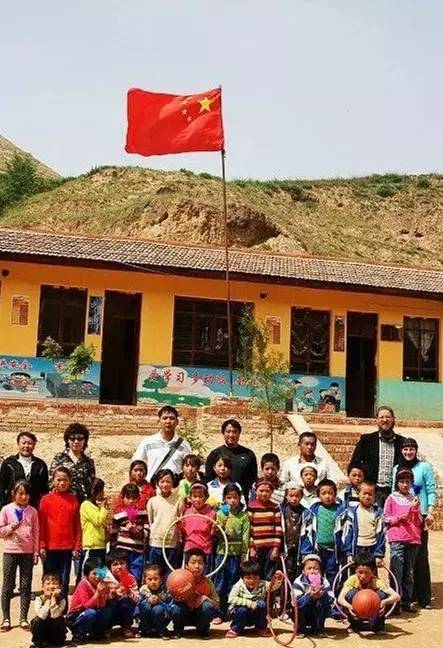
David’s spirit is really this pure. He doesn’t think about his own gains or losses, but instead busies himself with Chinese education. He can see beyond his own poor living circumstances to help reconstruct the schoolhouses for the children.
Everyone should learn from and respect this noble and pure soul. When we see a story like David’s, we should consider the following: when we are all rushing around in pursuit of money and we find we are eternally unsatisfied with material possessions, our souls will inevitably need something more. How do we define the value of our lives? Is it a scheme to gain fame and profit or is it to leave behind something brilliant and splendid?
After an interview with David on “Speak Frankly”, Cui Yongyuan said that “Today we met with David Deems. Many people think he is very special. But in fact, his simplicity and dedication to a cause should be everyone’s natural instinct or fundamental character. I hope that in the future when we talk about David, it will be like talking about the people all around us. This would make me very happy.”
That interview was in May 2000. Time has flown by since then, and today extraordinary people still talk about David Deems. Do we still think he is a special person?
Seventeen years ago, Cui Yongyuan truly hoped that everyone had David’s character. But in today’s profit-obsessed society, this kind of person is still of a different breed. How much farther will we have to go before regular people are like David Deems?



